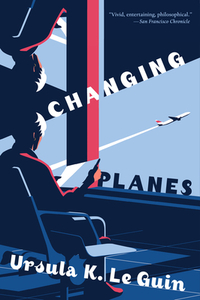Take a photo of a barcode or cover
adventurous
emotional
informative
inspiring
slow-paced
Plot or Character Driven:
Plot
Strong character development:
Complicated
Loveable characters:
Yes
Diverse cast of characters:
Yes
Flaws of characters a main focus:
Complicated
adventurous
reflective
This book is written almost in a short story format. Each of the chapters describes a different "plane" or dimension with its own people, culture, etc. All of the chapters tie back to the first chapter and the method of traveling from our plane to another. Overall, a fast read with a fascinating look at how humanity can end up.
funny
lighthearted
reflective
Not my favorite LeGuin by far, this collection of short stories strikes me as largely a bunch of thought experiments, some literary metaphors/allegories. Some are amusing, some are thought provoking, some are just weird.
there’s not much a narrative here, but it is pretty much perfect with what it sets out to do.
as always, le guin is just great with worldbuilding - creating unique cultures, exploring the implications of simple details, and using all of this to reflect back on ourselves.
as always, le guin is just great with worldbuilding - creating unique cultures, exploring the implications of simple details, and using all of this to reflect back on ourselves.
Ironic timing - reading the frame story about the misery of air travel in the early 2000's during the clusterfuck of air travel in late December 2022. I'll never tire of visiting the many worlds of my beloved Ursula Le Guin. "The Island of the Immortals" is quite a gut punch.
Ursula K. Le Guin takes us on a highly-imaginative, delightful tour of other planes of existence in this series of vignettes. The book is based on the premise that while sitting between planes (airplanes, that is) at the airport, we can travel to these other worlds and experience them while little time passes in our world. The Interplanary Agency governs travel between planes, including hotels, commerce, and travel restrictions. Le Guin's clever wordplay amuses throughout the book, as the narrator shares travellers' reports or travels themselves to such varied lands as a plane where a genetic experiment creates a group of children who are unable to sleep, one where American entrepreneurs force native Island inhabitants to work in their holiday-themed resorts, one where bird-like people consider changing their annual migration, and many with different linguistic practices than our own here on our version of Earth.
Just a content note that a couple of the stories are disturbing (the sleepless kids one was the hardest one for me), and a few reference rape and child abuse, which some may find particularly disturbing. All the stories are geared in some way to us reflecting on our own world and the similarities or differences between our world and the imaginative societies Le Guin portrays, and I think her use of violence is largely justified, but some people might feel the need to take a pass.
Just a content note that a couple of the stories are disturbing (the sleepless kids one was the hardest one for me), and a few reference rape and child abuse, which some may find particularly disturbing. All the stories are geared in some way to us reflecting on our own world and the similarities or differences between our world and the imaginative societies Le Guin portrays, and I think her use of violence is largely justified, but some people might feel the need to take a pass.
adventurous
inspiring
mysterious
reflective
medium-paced
An excellent collection of locations. Especially enjoyed The Island of The immortals. And The Fliers Of Gy.
pg 192-The Building
My species has a great many good reasons for making war, though none of them is as good as the reason for not making war. Our most rational and scientific justifications—for instance, that we are an aggressive species—are perfectly circular; we make war because we make war. Our justifications for making a particular war (such as: our people must have more land and more wealth, or: our people must have more power, or: our people must obey our deity’s orders to crush the sacrilegious infidel) all come down to the same thing: we must make war because we must. We have no choice. We have no freedom. This argument is not ultimately satisfactory to the reasoning mind, which desires freedom.
pg 192-The Building
My species has a great many good reasons for making war, though none of them is as good as the reason for not making war. Our most rational and scientific justifications—for instance, that we are an aggressive species—are perfectly circular; we make war because we make war. Our justifications for making a particular war (such as: our people must have more land and more wealth, or: our people must have more power, or: our people must obey our deity’s orders to crush the sacrilegious infidel) all come down to the same thing: we must make war because we must. We have no choice. We have no freedom. This argument is not ultimately satisfactory to the reasoning mind, which desires freedom.




